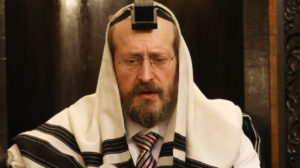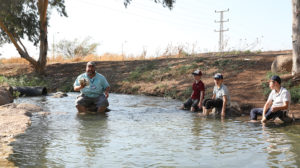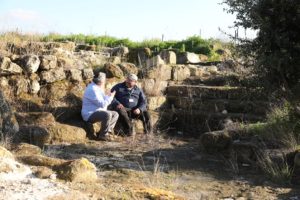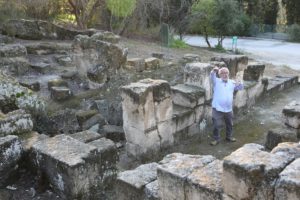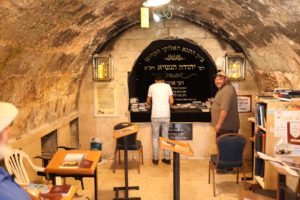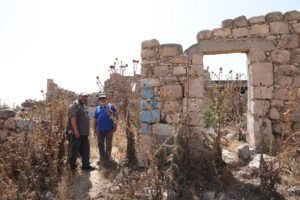Court Jew

A proud chassidic Jew captures hearts in Dubai
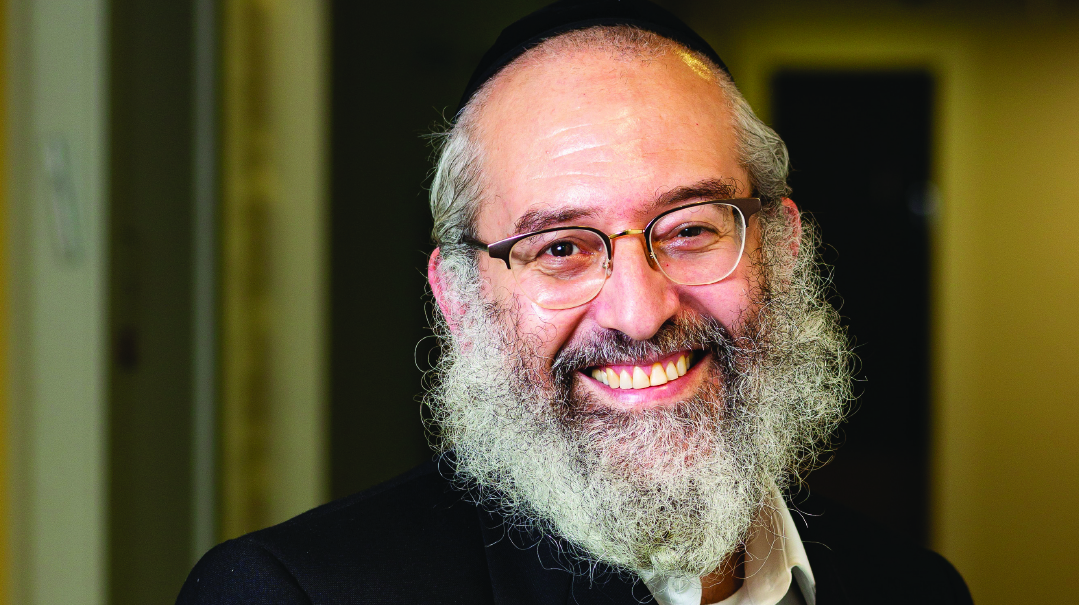
Photos: Elchanan Kotler, Cyril Bailleul
“How come you’re not wearing a yarmulke like my friend Moshe?”
For the former Israeli government official visiting His Highness Sheikh Ahmed bin Faisal Al-Qassimi of the United Arab Emirates, this uncomfortable question came as a stumper. There was an awkward pause in the sheikh’s immense meeting room overlooking Dubai.
The sheikh was asking this question because the day before, he’d met Rabbi Moshe Shapoff, a cheerful 51-year-old Brooklyn-born Karlin-Stoliner chassid, who was in Dubai as part of an American-Israeli business delegation. It was an opportune meeting, not just for the sheikh, and not just for Moshe Shapoff.
As Reb Moshe recounts the story, it’s clear why he made such an impression on the sheikh. With his unassuming demeanor, ready smile, and ability to form an easy rapport with colleagues across the board, Moshe Shapoff is a worthy ambassador for Klal Yisrael. Weeks afterward, he’s still amazed by the episode, and by the unusual relationship that was to follow.
“I don’t look for publicity, that’s not my nature,” says Moshe. “I’m a simple person, with nothing to hide. People today think that you have to lower your religious standards to go into the business world. But really, you can just be yourself, be who you are, and you can’t lose in the long run. All these Israelis were coming up to me afterwards, saying, ‘Oh, Moshe, how did you do that?’”
Warm Welcome
Before moving to Israel two decades ago (today he lives with his family in Givat Ze’ev outside Jerusalem), Moshe had been connected to Rav Moshe Weinberger’s Aish Kodesh kehillah in Woodmere and still refers to Rav Weinberger as his rebbi. He has formed other notable connections over the years, having learned in Jerusalem’s Yeshivas Torah Ore for many years where he became a close talmid of Rav Chaim Pinchas Scheinberg ztz”l. He has served for six years as a gabbai for Rav Shlomo Bussu (a noted grandson of the Baba Sali, profiled in “Time to Shine the Light,” Issue 704), and has worked in promoting education programs for chareidim seeking to enter the Israeli workforce at Lomda-Campus Strauss. Through it all, he has remained a devoted chassid of the Karlin-Stoliner Rebbe, and has been involved in numerous projects and initiatives within his chassidus.
Several years ago, Moshe Shapoff joined the investor relations department for TR Capital Management, a US fund specializing in buying bankruptcy claims from companies, established by his close friend Terrel (Tzuriel) Ross of Woodmere. Because of the rise in bankruptcies caused by COVID-19, the fund had lately attracted the interest of overseas investors, leading Moshe to become involved in the world of “family office investment summits.”
“Family offices” are private wealth management advisory firms that serve ultra-high-net-worth investors. They differ from traditional wealth management shops in that their services are targeted to affluent individual families, formulating plans for future generations. These family offices periodically offer their clients “investment summits” — essentially small, exclusive conferences where funds like TR Capital Management can make a focused pitch.
Sir Anthony Ritossa is well-known in the world of investment summits, organizing very large events in both Dubai and Monaco that bring in family offices, businessmen, and dignitaries from all over the world. Moshe Shapoff got his introduction to this rarefied atmosphere when Ritossa had invited TR Capital Management to previous summits in the last couple of years. He formed a close friendship with Ritossa as a result.
Three months ago, following the Abraham Accords, Ritossa organized a special summit for his clients from the various royal families that make up the UAE’s ruling class. At this summit, to be held in Dubai, TR Capital would be meeting with local aristocracy. Ritossa made sure Moshe was invited as well, and as it happened, the Karlin-Stoliner chassid would be the only one attired in the dress of a certain other aristocracy.
“The first time I came to Dubai, a year and a half ago, I was very nervous,” Moshe admits. That was before the recent Israel-UAE peace treaty that, until the skies closed due to COVID, saw Israelis coming in droves. “You came into the Dubai airport — it’s huge — and there’s a whole line of passport control agents. In other places they wear uniforms, but here they’re in their white robes. I felt like I was in a mosque. I gave the guy my passport, and he looked at it and smiled and told me ‘Shalom.’ And that was my welcome to Dubai.”
This time around, he was already a comfortable visitor.
On the first day of the conference, Moshe was approached by several attendees who knew him from his previous trips to Dubai. They told him they really wanted him to meet a sheikh who was attending the summit and with whom they were well-connected. The meeting was arranged in short order, and Moshe was brought to the sheikh’s accommodations.
The sheikh, His Highness Sheikh Ahmed bin Faisal, is a prince from the royal house of Al-Qassimi — the oldest ruling family in the UAE and one of the oldest houses in the entire Middle East. Two of the seven emirates that constitute the UAE, Sharjah and Ras al Khaimah, are ruled by the Al-Qassimi family. (Dubai is itself also an emirate, as is the capital, Abu Dhabi.) The sheikh, 41, was educated in the UK and has taken an active role in the family’s investments in Britain and the United States.
Moshe Shapoff entered the large room where the sheikh and all his advisors, together with the executives overseeing his various concerns, were seated on a long row of couches. Moshe was brought up to the head of the room, to an empty place on the sheikh’s couch — face to face with the sheikh himself — and was told to sit down.
“Directly in front of us was a crowd of photographers,” Moshe recalls. “They were all snapping pictures. I felt like I was at a press conference.”
Amid the flashes and clicking shutters, Moshe tried his best to stay focused on his host and not get distracted by the surrounded action.
“I just focused in on him, and tried not to think at all about what was going on around me,” he says. “I was totally unprepared. But I just looked into the sheikh’s eyes and — I am a very simple person, so who am I to say? — I just sensed a certain humbleness, a certain openness.
“He actually wasn’t talking so much, so I was trying to think of things to say. I asked him about what he thinks of the situation today, the peace between Israel and the United Arab Emirates, and he was very positive and happy about it. We spoke about a few more things before it was time to wrap up. It was a very nice conversation.”
Royal Reward
Their chat was brief, but clearly it left quite the impression on the sheikh. The rest of his day’s schedule was filled with meetings with captains of Israeli industry and former government ministers. But at day’s end, the sheikh told an advisor, “The one I enjoyed meeting the most was Moshe Shapoff.” And he made specific mention of Moshe’s yarmulke.
Moshe himself, meanwhile, was interviewed on camera by a reporter from Dubai TV, a global Arabic media network with an average daily viewership that dwarfs CNN’s. He spoke eloquently about the emerging peace between Israel and the Arab world, and the win-win opportunities it creates — access to Emirati investment capital for Israeli companies, access to Israeli advances in agriculture, medicine, and technology for the UAE.
“It’s like an engagement,” he quipped on the air. “We’ll get to the wedding soon.”
Moshe certainly comported himself well before Dubai TV. But he remains bewildered that they sought him out.
“They were asking me, Moshe Shapoff, what I think about business ties between Israel and the UAE,” he says, still laughing in disbelief. “And this went out to the entire Arab world — not only the Emirates, but also Saudi Arabia, Kuwait, the whole GCC [Gulf Cooperation Council]. I don’t know how many millions of people saw that video.”
The next day came the fateful meeting in which the sheikh inquired after the former Israeli government official’s lack of head covering. The investment summit ended the day after that, but meanwhile, the sheikh was still mulling over his meeting with Moshe Shapoff. He put a message through to summit organizer Sir Anthony Ritossa.
Soon the message reached Moshe: The sheikh wanted to personally present him a royal award at a ceremony attended by all the summit participants. An advisor to the sheikh told Moshe, “You’re the only one, out of all the Israelis who were there, that he wants to give a private award to.” The advisor emphasized that it was because the sheikh enjoyed their conversation — but also because Moshe was the only one who was dressed like his picture of an authentic Jew.
The night of the ceremony saw a crowd of hundreds gather in a lavish event hall. Again, a crew of assembled photographers stood by with flashes ready. Then Moshe was called up to the podium by name.
“It was actually quite embarrassing,” Moshe recalls. “I was standing there with the sheikh to shake his hand, and he gives me the award, and they take more pictures, it was a whole thing. The whole audience was clapping, going crazy. And all this because I was the only one wearing a yarmulke.”
He shows a photo of the award. “Truthfully, it’s very nice when you see it, it’s beautiful. I really cherish it.”
After the ceremony, Moshe decided to reciprocate and present a token of appreciation for the sheikh’s kindness. He had brought with him several artistically designed metal washing cups to distribute among members of Dubai’s nascent Jewish community, and found himself with one extra. He sent it to the sheikh through an advisor, along with an explanation that although the cup is decorative, its actual function is a symbol of purity.
A few days later, after returning to Israel, Moshe received a voice message from the advisor, saying, “Moshe, I’m standing now with His Royal Highness, and he wants to personally thank you for the gift.”
The phone was handed to the sheikh, who said, “Moshe, thank you for the gift. I hope we meet again, inshallah [Arabic for b’ezras Hashem].”
“I was amazed that he called just to say thank you for this small gift,” Moshe says in obvious wonderment. “I’m now in regular contact with his chairman and CEO.”
Stay Higher
Moshe insists that any frum Yid could have done what he did, under the same circumstances. Accepting awards from royalty in sumptuous surroundings before cheering crowds and flashing cameras sounds like something distant from those who get their spiritual nourishment from the beis medrash — but although Moshe is part of the business world today, it’s clear he’s taken the ideals of the beis medrash with him. He cites a mashal that he heard in the name of Rav Yitzchok Hutner ztz”l regarding kiruv, which has relevance for people going into the business world as well.
“Rav Hutner asked, why is Big Ben so tall?” Moshe relates. “Well, if Big Ben were only the height of a person, then someone could check his watch against Big Ben, and if he found a discrepancy in the time, he would reach out and adjust Big Ben’s hands to the same time as his watch. But because Big Ben is so tall, when a person checks his watch against it and sees a discrepancy, he’ll change his own watch instead.
“Regarding kiruv, it means that people shouldn’t think they have to lower their standards to be mekarev someone — if you stay on a high level, others will strive to reach that as well. But it’s applicable for people going into business as well. If you stay up high and keep true to who you are, then b’ezras Hashem, you’ll have siyata d’Shmaya, and you won’t have to be embarrassed.”
Moshe did have a personal nisayon at the recent summit. He found that his novel appearance attracted considerable attention, and he constantly found himself surrounded by groups of prominent people. In one such situation, he was caught off guard when a businesswoman from Eastern Europe held out her hand to introduce herself. He was in a quandary, because they were standing among a group of eminent attendees.
“If you put out your hand and the other person doesn’t take it, it’s the most degrading thing that could happen to you,” he says. “But I’ve seen that if I can feel their pain and embarrassment, understand what they’re experiencing, and smile and say in a nice way, ‘If I could, I would shake your hand, but I’m not allowed to because of Jewish law…’ then there will be no hard feelings.
“Still, it was a real challenge for me to say it in front of everybody,” he acknowledges. “But it was unbelievable, she took it with magnanimity. It was very special.”
Building Trust
That said, Moshe advises travelers to study up on the local culture before coming. There are important differences in the way Emiratis conduct business, and in the way they conduct themselves in general, that would-be visitors would behoove themselves to abide by.
“You have to build a trust with Emiratis,” he says. “That’s true in any business relationship, but especially so with them. They also know that people look at them and assume they have money. But building trust takes time and patience. A lot of Israelis went there and thought it would go like, ‘Tachlis, let’s do business.’ It doesn’t go like that. Also, their business culture is a little different — they’ll address you as ‘my brother.’ To us as Americans, it sounds a little, you know… not genuine. But that’s their culture, that’s their way of conferring respect. Their culture is to extend honor.”
In light of that, Moshe says, Jewish guests need to respect that local culture, not try to take advantage of it — and constantly check their own behavior for signs of, shall we say, informality.
“All the Israelis I was with said they’re terrified of what’s going to be when all their landsmen start coming here, yelling, ‘Dudu, tein li et zeh!’” Moshe says. “You have to respect the culture and go a little more on the low-key side. You can’t just say, ‘I’m going to be who I am.’ Yiddishkeit-wise, you can be who you want to be. As far as how you are acting outwardly in public, you have to respect the culture and the people.
“I wish there were a way to get across to people traveling to Dubai, to tell them ahead of time — respect the culture, honor the people, and they’ll honor you.”
Meanwhile, the news of Moshe’s success in Dubai has apparently gotten around. He is now seen as the expert on Emirati mores — and his counsel is being solicited from some unlikely quarters.
“Just last week I got a call from the Foreign Ministry,” he recounts, sounding amused. “They said they want me — mamash a little guy — to help them! They told me, ‘Moshe, we heard about you.’
“I was on the speakerphone with them for 45 minutes, telling them everything I just told you. I davka told them this thing that happened with the yarmulke, but made sure to emphasize that they didn’t have to listen to me. ‘You should just know this is what happened. But you can do what you want…’ ”
Home Hospitality
When the Abraham Accords were announced last year, interest in the UAE, and in Dubai in particular, spiked in Israel and the US Jewish community. The promise of direct flights from the UAE to Ben-Gurion Airport — currently on hold due to coronavirus — had many people planning trips to Dubai.
Moshe Shapoff can confirm that in addition to being warm and welcoming to Jews, Dubai also offers many amazing sights and wondrous attractions.
For many, the Burj Khalifa symbolizes the UAE’s wealth and power. Standing 2,722 feet high (about 830 meters), with 163 stories, it is the world’s tallest structure. Moshe says the view at night from the 130th floor is not to be forgotten. The Armani Hotel, inside the Burj Khalifa, houses a kosher restaurant called Kaf.
Right next door to the Burj Khalifa is the Dubai Mall, also the largest of its kind in the world. It houses a giant aquarium; visitors can submerge in a diving bell to better view the sharks. Large, ornate malls are commonplace in the UAE, where the brutal summer heat typically reaches 115°F. To offer relief, one mall features indoor skiing and ski lifts. Visitors are advised to wear a coat.
The list of other notable sites is too long to detail, but would surely include the Burj Al Arab, the world’s only seven-star hotel, which offers convenient heliport access on the roof; and the gigantic Atlantis Hotel, constructed on the famous Palm Island — a manmade island reclaimed from the sea, designed in the shape of a palm tree.
Even more amazing than the tourist wonders, though, is the local hospitality — especially when proffered to Jewish visitors. It can come as a shock to those accustomed to fearing Arabs as the enemy.
“There’s a genuine warm feeling toward Jews,” he says. “Wherever I went, people were very welcoming, saying hello, shalom, Israel… I was walking by the mall and there were two Emiratis there, sitting and having coffee, and they called me over, invited me to sit down and told me, ‘We’re so happy you’re here.’ Wherever I went, I was like a celebrity. And again, it was because they knew I was a Yid. My appearance was a dead giveaway.”
Now’s the Time
During his stays in Dubai, Moshe Shapoff has come to know the small but growing Torah-observant community that is taking root there. He says the plans for viable frum life in the UAE are largely being driven by two men with mesirus nefesh: Ross Kriel and Rabbi Levi Duchman.
Ross Kriel, originally from South Africa, has been living in Dubai for 12 years with his family. He has been running the minyan for most of that time, but also focuses on building the infrastructure a Jewish community will need. His wife, Elli, runs a catering firm there called Elli’s Kosher Kitchen.
“Ross is a visionary and also has a lot of knowledge and experience with the Emirate culture, people, and government, and fully believes in the potential for a vibrant Jewish community to be developed in Dubai, especially now,” says Moshe.
Rabbi Levi Duchman of Chabad, originally from New York, has been in Dubai for six years, and has singlehandedly traveled not only the entire UAE but also to several other countries in the Gulf Cooperation Council as well, finding Jews and spreading Yiddishkeit. Recently, Rabbi Duchman opened a Chabad House in Dubai that hosts a minyan, and he helped oversee the opening of a local kosher restaurant as well.
“When I was there for the conference, we had a packed minyan of about 25 people — many from Eretz Yisrael,” Moshe says. “We had breakfast there. It was special, unbelievable. For the most part, Ross Kriel is focusing on building a community, and Rabbi Duchman is focusing on meeting the needs of travelers and tourists,” Moshe explains. “Each of them has his own territory, and if the past few months are any indication, no one is going to be out of work so fast.”
(Originally featured in Mishpacha, Issue 849)
Oops! We could not locate your form.
